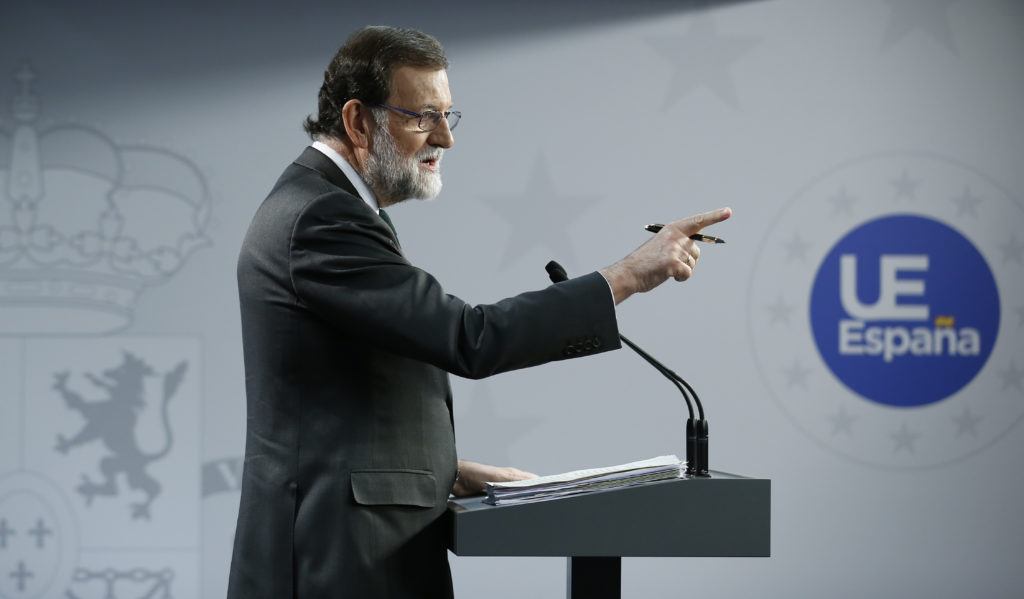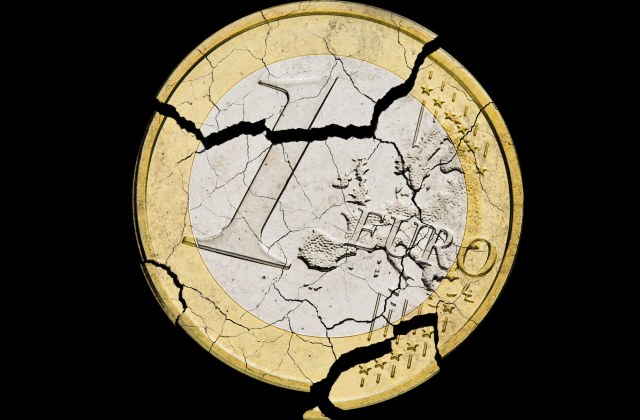Martin Wimmer, Getty

This is a sobering moment. A European democracy, locked in a constitutional standoff, has just declared a state of emergency. Footage of a brutal clampdown by security forces, acting on government orders, has been condemned around the world.
A regional Parliament now looks likely to be suspended and its elected members sacked, as the national capital imposes direct rule. Local TV and radio stations are set to be taken over, depriving an ancient civilisation – with its own language, culture and distinct identity – of a national voice.
Hundreds of thousands have taken to the streets in protest. And most worrying of all, perhaps, rival regional and national police forces are at loggerheads. Those employed and trusted to contain violence are now in danger of perpetrating violence among themselves. Welcome to the eurozone’s fourth-largest economy. Welcome to modern Spain.
This crisis in Catalonia has been many years in the making. Since the ‘unofficial’ referendum on 1st October, though, events have escalated to such an extent that we could be at a historic turning point. Last weekend, Spanish Prime Minister Mariano Rajoy announced plans to invoke Article 155 of the Spanish Constitution, dissolving the Catalan government and curtailing the power of the regional Parliament, with national authorities taking charge of Catalonia’s media and police force.
This coming Friday, the Spanish Senate, where Rajoy’s conservative Popular Party has a majority, is expected to approve these plans – the first use of such emergency powers since Spain’s modern constitution was written in 1978. While Article 155 allows the central government to strip the autonomy of a region that is “seriously prejudicing the general Spanish interests”, Catalonia’s emboldened separatist movement is unlikely to accept Madrid’s actions. Rajoy’s tactics will surely provoke further conflict, rather than peace.
The implications of what is happening in Catalonia will reverberate across Europe and the wider world. As this crisis reaches boiling point, evoking chilling echoes of Spain’s violent past, the silence from the European Union has been deafening – not least as any Brussels edict would add more fuel to the separatist fire.
This Spanish crisis brings into focus, then, the growing power of populism, as a vibrant electorate distances itself from a remote supra-national body. But millions of Catalans are also questioning the nation state itself, as they feel it doesn’t represent their interests.
There is no doubt that Catalonia’s referendum was unconstitutional. While 90% of the votes cast just over three weeks ago backed independence, the turnout was only 43%. Some three million of Catalonia’s 5.3 million voters refused to take part in an illegal referendum.
Having said that, Catalans have been pushing for independence for a very long time. Separatism has century-old roots in this part of Spain, and was one of the factors that plunged the country into civil war in the 1930s – resulting in General Franco’s long dictatorship. In 2006, after an entirely legal referendum in Catalonia, a plan to give the region more autonomy was approved by both Catalan and Spanish lawmakers. The transfer of powers, though, was partially revoked by the Spanish Constitutional Court in 2010, after Rajoy’s Popular Party campaigned vehemently against it. That resulted in a million-strong demonstration in Barcelona, Catalonia’s regional capital. ‘Som una nacio, nosaltres decidim’ the protesters cried in their own Catalan language. ‘We are a nation, we decide’.

Since then, attitudes have hardened, not least due to economics. Catalonia accounts for a fifth of Spanish GDP and 25% of the entire nation’s exports. While Catalonia generates an income per head that is 15% above the EU average, the rest of Spain registers a figure 10% below.
During the eurozone financial crisis of 2010-2012, the meltdown of Spain’s banking sector provoked a prolonged recession. During that period, prosperous Catalonia pushed for a better fiscal deal that it didn’t get. Since then, the Spanish economy has partially recovered but Rajoy’s assumption that an economic upswing would see a tempering of demands for independence has been proved wrong.
Watching this Catalan crisis, I’d make two observations. The first is that, when it comes to separatism, economics wins. Why is the impetus towards Catalan secession so strong – and possibly unstoppable? Because Catalonia itself is a viable economy, which has little debt of its own and transfers around 8% of its GDP to Madrid each year – a sizeable subsidy to the rest of Spain. Meanwhile, momentum towards Scottish independence has stalled because Scots have been reminded their country is a huge net recipient of funding from the rest of Britain. The collapse in oil prices from an average of $86 a barrel during 2014, the year the referendum took place, to just $41 the year after, has certainly focused minds. As crude prices have fallen, the projected finances of a post-independence Scotland look a lot less clever than they once did – something that’s been reflected in subsequent opinion polls.
Economics also helps explain why two wealthy Italian regions just voted for greater autonomy from Rome. Last weekend, both Lombardy and Veneto opted for more regional powers. Lombardy is home to financial capital Milan, while Veneto contains the tourism magnet that is Venice. While referenda are non-binding under the Italian constitution, both regions could use these results as leverage, as they argue to retain more of their own tax revenues. Between them, Lombardy and Veneto drive 30% of Italian GDP – a GDP that has yet to fully recover the level it reached ahead of the 2008 financial crisis.
In Italy – as in Spain – wealthy regions are looking to distance themselves from nation states they believe are dysfunctional and corrupt. As the Western world loses its hegemony, and living standards come under threat, successful regions will want to keep more of their own wealth for their own people. This is a trend that’s set to become more defined.
My second observation relates to this Catalan crisis in the context of the broader EU. Events in Catalonia are not the fault of Brussels – the blame lies, instead, in the bull-headed stubbornness of successive Madrid governments. The EU’s response, though, since early October has been risible. And what we are seeing in Catalonia – a breakdown of trust between voters and leaders they view as distant and unaccountable – increasingly applies to Brussels as well.
During the Catalan referendum, the Spanish government sent in riot police that smashed up polling stations and attacked voters of all ages. Elected Catalan leaders were then jailed on charges of sedition, with each side accusing each other of staging a coup. This is terrifying stuff – particularly in a country that emerged from fascist dictatorship just 40 years ago, and where the memory of civil war looms large. “There is no room nor space for any kind for mediation or international initiative or action,” said European Council President Donald Tusk, reading out a statement no doubt written for him by the eurocrats. It is difficult to think of a less inspiring, more insipid response.
Across the EU, electorates are increasingly moving away from the mainstream (Matthew Elliott examines the causes in an article for UnHerd today). In France, Marine Le Pen won over a third of the popular vote earlier this year, and the support of almost half of those aged between 18 and 25. Recent votes in Germany and Austria have seen a surge in support for hard-right nationalists. In Holland, Gert Wildeers was recently beaten, but his anti-EU party doubled its number of Parliamentary seats and is now firmly established as the official Dutch opposition. Even in prosperous Scandinavia, anti-establishment parties such as the Swedish Democrats and the True Finns are amassing support, on a message of Euroscepticism.
The ‘European project’ is under pressure on a variety of fronts. Events in Spain are merely the latest threat. If Catalonia manages to gain independence, a large eurozone economy will suddenly become fiscally much weaker. Investors have so far avoided panicking about Catalonia. Bond yields have remained relatively stable, on expectations a compromise deal will emerge.
If secession looms into view, though, Spain’s national debt could rise from around 100% of GDP to 120%, once the liabilities are shared with a departing Catalonia and the region’s chunky economy is then removed from overall national income. That could spark a return of the euro-zone bond crisis, despite endless money-printing by the European Central Bank. That’s why Madrid is under so much international pressure to prevent Catalonia from leaving.
When it comes to democracy, the EU has a bad name. Referendums in nations ranging from France to Denmark to Ireland have been re-run over the years, under huge pressure from Brussels, when electorates have failed to produce the correct – that is, pro-integrationist – answer. Just as Brexit is a challenge to such centralisation, so are secessionist pressures from the Catalans.
Catalonia must surely be granted the opportunity to determine its own future – and soon. The region should be allowed to vote to decide its destiny, whatever the views of the rest of Spain. Unless the EU supports this, it will be seen – again – as anti-democratic and remote. If the Catalonia quits Spain, though, any resulting bond crisis could tear the eurozone apart.










Join the discussion
Join like minded readers that support our journalism by becoming a paid subscriber
To join the discussion in the comments, become a paid subscriber.
Join like minded readers that support our journalism, read unlimited articles and enjoy other subscriber-only benefits.
Subscribe